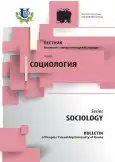Interconnection of socio-cultural adaptation and identity in the socialization process
- Authors: Rakhmanova LY1
-
Affiliations:
- Saint Petersburg State University
- Issue: No 2 (2015)
- Pages: 49-58
- Section: ARTICLES
- URL: https://journal-vniispk.ru/2313-2272/article/view/340620
- ID: 340620
Cite item
Abstract
The article considers the influence of the socio-cultural adaptation of an individual on his personality and identity structure; analyzes the processes of primary and secondary socialization in comparison with subsequent adaptation processes, as well as the possibility of a compromise between the unchanging, rigid identity and the ability to adapt flexibly to the changing context. The author identifies positive and negative aspects of adaptation in the contemporary society while testing the hypothesis that if the adaptation is successful and proceeds within the normal range, it helps to preserve the stability of social structures, but does not contribute to their development for the maladaptive behavior of individuals and groups stimulates social transformations. In the second part of the article, the author shows the relationship of the socio-cultural identity and the individual status in various social communities and tries to answer the question whether the existence and functioning of the social community as a pure ‘form’ without individuals (its members) is possible. The author describes the identity phenomenon in the context of the opposition of the universal and unique, similarities and differences. The article also introduces the concept of the involvement in the socio-cultural context as one of the indicators of the completeness and depth of individual socio-cultural adaptation to a certain environment, which is quite important for the internal hierarchy of individual identity.
About the authors
L Y Rakhmanova
Saint Petersburg State University
Author for correspondence.
Email: muza-spb@yandex.ru
Chair of Cultural Anthropology and Ethnic Sociology
References
- Bekker V. Soobshhestvo i obshhestvo. Ob osnovnyh ponjatijah social'noj filosofii i nekotoroj istoricheskoj neizbezhnosti // Nauchnye i vnenauchnye formy myshlenija. M., 1996.
- Bodrijar Zh. Obshhestvo potreblenija. Ego mify i struktury. M., 2006.
- Brubejker R.K. Za predelami «identichnosti» // Ab Imperio. 2002. № 3.
- Gusserl' Je. Krizis evropejskih nauk i transcendental'naja fenomenologija // Gusserl' Je. Filosofija kak strogaja nauka. Novocherkassk, 1994.
- Danilova E.N. Nestabil'naja social'naja identichnost' kak norma sovremennyh obshhestv // Sociologicheskie issledovanija. 2004. № 10.
- Derrida Zh. Jesse ob imeni. M.; SPb., 1998.
- Dudchenko O.N., Mytil' A.V. Social'naja identifikacija i adaptacija lichnosti // Sociologicheskie issledovanija. 1995. № 6.
- Kamilleri K. Identichnost' i upravlenie kul'turnymi nesootvetstvijami: popytka tipologii // Voprosy sociologii. 1993. № 1/2.
- Nansi Zh.-L. Neproizvodimoe soobshhestvo / Per. s fr. Zh. Gorbylevoj. M., 2011.
- Turen A. Vozvrashhenie cheloveka dejstvujushhego. Ocherk sociologii. M., 1998.
- Jerikson Je.G. Identichnost': junost' i krizis. M., 1996.
- Jadov V.A. Social'nye i social'no-psihologicheskie mehanizmy formirovanija social'noj identichnosti lichnosti // Mir Rossii. 1995. № 3/4.
- Abrahams R.D. Ordinary and extraordinary experience // The Anthropology of Experience. University of Illinois Press, 1986.
- Bauman Z. From pilgrim to tourist - or a short history of identity // Questions of Cultural Identity. L., 1996.
- Berger P.L., Luckmann T. The Social Construction of Reality. A Treatise in the Sociology of Knowledge. Penguin Books, 1991.
- Calhoun C. The variability of belonging. A reply to Rogers Brubaker // Ethnicities. 2003. № 3.
- Geertz C. From the native’s point of view: On the nature of anthropological understanding // Interpretive Social Science. Berkeley, 1979.
- Giddens A. Modernity and Self-Identity: Self and Society in Late Modern Age. Cambridge, 1991.
- Grimes R.L. Deeply into the Bone: Re-Inventing Rites of Passage. University of California Press, 2000.
- Hall S. Introduction: Who needs “Identity” // Questions of Cultural Identity. L., 1996.
- Hegemony and Socialism: An Interview with Chantal Mouffe and Ernesto Laclau // Palinurus. 2007. № 14.
Supplementary files









